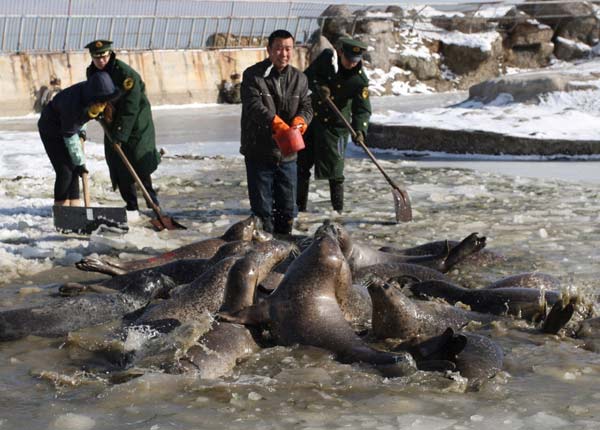Society
New freeze to disrupt holiday travel plans
Updated: 2011-01-18 07:30
By Cheng Yingqi and Tan Zongyang (China Daily)
JINAN - Thirty-five percent of the Bohai Sea off China's east coast was covered by ice as a new cold wave hit East and South China.
|
 |
|
A worker at a conservation center in Yantai city, East China's Shandong province, feeds some seals on Sunday. [Photo/Xinhua] |
On Monday, the frozen area had extended to 33,905 square kilometers, increasing 5.2 percent in a single day.
The National Marine Environmental Forecasting Center released a level IV warning on its website at 4 pm on Monday, saying that the three major bays of Bohai Sea - the Liaodong, Bohai and Laizhou bays - will be covered with a 10- to 20-centimeter-thick layer of ice in the next three days.
Also, the northern part of the Yellow Sea and some main ports in China, such as Tianjin Port, Qinhuangdao Port in Hebei province and Jinzhou Port in Liaoning province, will see floating ice this week.
| ||||
At the coastal village of Haimiaokou, Laizhou city, waves have been pushing ice blocks back and forth, crushing fishing boats stuck in the ice, witnesses said.
"Some fishermen had removed their boats from the water before the freezing weather, which starts every January and lasts for 60 or 70 days, because colliding ice blocks can break an 8-meter-long boat in a few hours," Fang said.
Meanwhile, sea ice caused losses to transport vessels at the Laizhou Port, the primary port for oil and coal shipping in the Shandong Peninsula.
"For example, an oil tanker with a 50,000-ton capacity could enter the port in less than an hour in good weather, but it takes three hours now because of the need for icebreaking," Yan Rukun, head of the pilot station in Laizhou, told local media.
About 10 overseas vessels were stranded at docks at Laizhou Port and had to pay "tens of thousands US dollars" for demurrage charges, Yan said.
In South China, low temperatures and heavy freezing rains caused concern for the 40-day peak travel season of Chinese New Year.
Forecasts said snow would sweep across South China, with heavy downfalls pounding parts of Hunan province and neighboring Jiangxi province this week.
China's railway authorities said the icy weather this year would make it more difficult to carry passengers safely home during the Spring Festival holiday.
"A lot of work has been done in preparation for the extreme weather," Vice-Minister of Railways Wang Zhiguo said at a news conference on the weekend.
According to Wang, 500 internal combustion locomotives and 750 power-generating sets would be available to move trapped passengers. As well, food and drinking water will be available for passengers trapped in railway stations.
Wang also suggested that passengers should closely follow weather forecasts to arrange or adjust their travel plans.
Zhao Ruixue contributed to this story.
E-paper

Ear We Go
China and the world set to embrace the merciful, peaceful year of rabbit
Preview of the coming issue
Carrefour finds the going tough in China
Maid to Order
Specials

Mysteries written in blood
Historical records and Caucasian features of locals suggest link with Roman Empire.

Winning Charm
Coastal Yantai banks on little things that matter to grow

New rules to hit property market
The State Council launched a new round of measures to rein in property prices.




